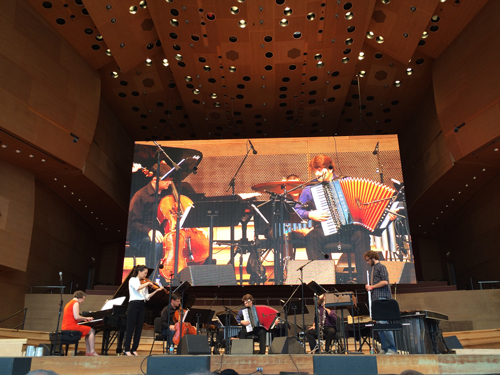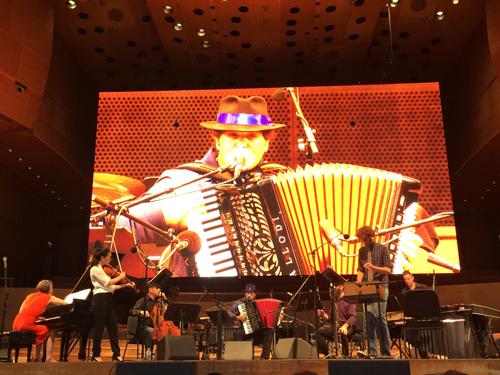By Daniel Hautzinger
Contemporary chamber groups may be the orchestras of the future. Where in the past classical music performances were primarily dressy affairs in concert halls, that is slowly being augmented by relaxed recitals in hip venues, ideal for small, forward-looking ensembles. The versatility of musically omnivorous groups eighth blackbird is an important attribute in the age of the Internet, where genre lines are dissolving and tastes are expanding.
On Thursday, June 19, as part of the free “Loops and Variations” concert series in Chicago’s Millennium Park, eighth blackbird and hyper-accordionist Michael Ward-Bergeman presented an eclectic program demonstrating that versatility.
Ward-Bergeman’s Barbeich, arranged by blackbird flutist Tim Munro,set the tone for the concert. The portmanteau title combines the names of its main influences, Argentine accordionist Raúl Barboza and iconic minimalist Steve Reich. Clarinetist Michael J. Maccaferri beautifully merged his sound with Ward-Bergeman’s accordion in a melancholy theme bolstered by mysterious repeated patterns in the rest of the ensemble.
Those oscillating parts were present throughout the concert, becoming slightly tedious by the end. But they were inventively varied by Bryce Dessner in his rustic Murder Ballades, written for eighth blackbird, and the only work performed without Ward-Bergeman. Dessner is a guitarist in the indie band The National, and the seven part Murder Ballades is like that band’s songs: simple but augmented by distinguishing touches. Repeating patterns were suddenly sweetened by woodwind flourishes, or festive melodies were darkened by modal inflections. Performing with exuberance, the ‘birds blended seamlessly in spite of the outdoor setting and uneven miking. Unfortunately, the work’s final section lacks the artfulness of the rest of the piece, making for a disappointingly generic ending.
The second half of the concert consisted of two sets. The century-hopping “Songs of Love and Loss” was a compelling journey from light to dark and back. Trio for Heart and Breath by Richard Reed Parry (a member of the indie band Arcade Fire) took its tempo from pianist Lisa Kaplan’s heartbeat. A gentle melody played by Ward-Bergeman and Yvonne Lam on violin conjured an embryonic serenity.
The descending ostinato bass line of Monteverdi’s Lamento della Ninfa dragged the mood into woefulness, continued by Gesualdo’s Morro Lasso, which was colored by downward pitch-bending. Both Renaissance madrigals were arranged by Munro. Finally, Kaplan’s arrangement of indie musician Bon Iver’s Babys pulled the concert back into sunny contentment, with cellist Nicholas Photinos and Lam on viola uncannily imitating Bon Iver’s multi-tracked vocals.
In a choice that came out of left field, the concert ended with a set of New Orleans tunes. Ward-Bergeman took the lead, soloing and singing while the ‘birds moved slightly outside their normal purview: Munro and Maccaferri reveling in improvisations, Kaplan crooning on harmonica, and percussionist Matthew Duvall playing drum set. The Tom Waits-like “St. James Infirmary” deserves special note for Maccaferri’s ripping klezmer solos and its spooky atmosphere.
Such an eclectic program is bound to have its ups and downs, and Thursday was no exception. But eighth blackbird’s willingness to hop between styles is what’s needed to bring new audiences to classical music. Their adaptability allows them to play both indie-influenced classical and the most avant-garde contemporary works, as well as everything in between. Ideally, listeners from both ends of that spectrum will discover the opposite side through groups like eighth blackbird, for it is through such co-mingling that the most interesting art can emerge.
Published on ClevelandClassical.com June 23, 2014.
Click here for a printable copy of this article.




